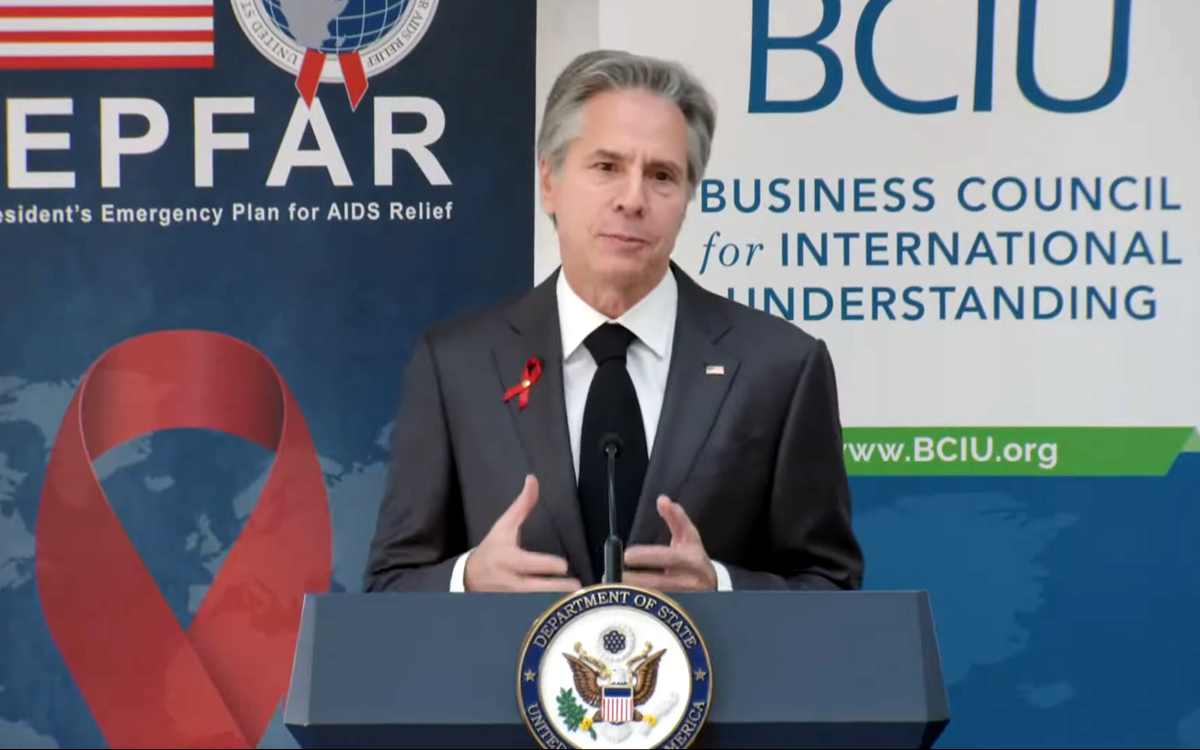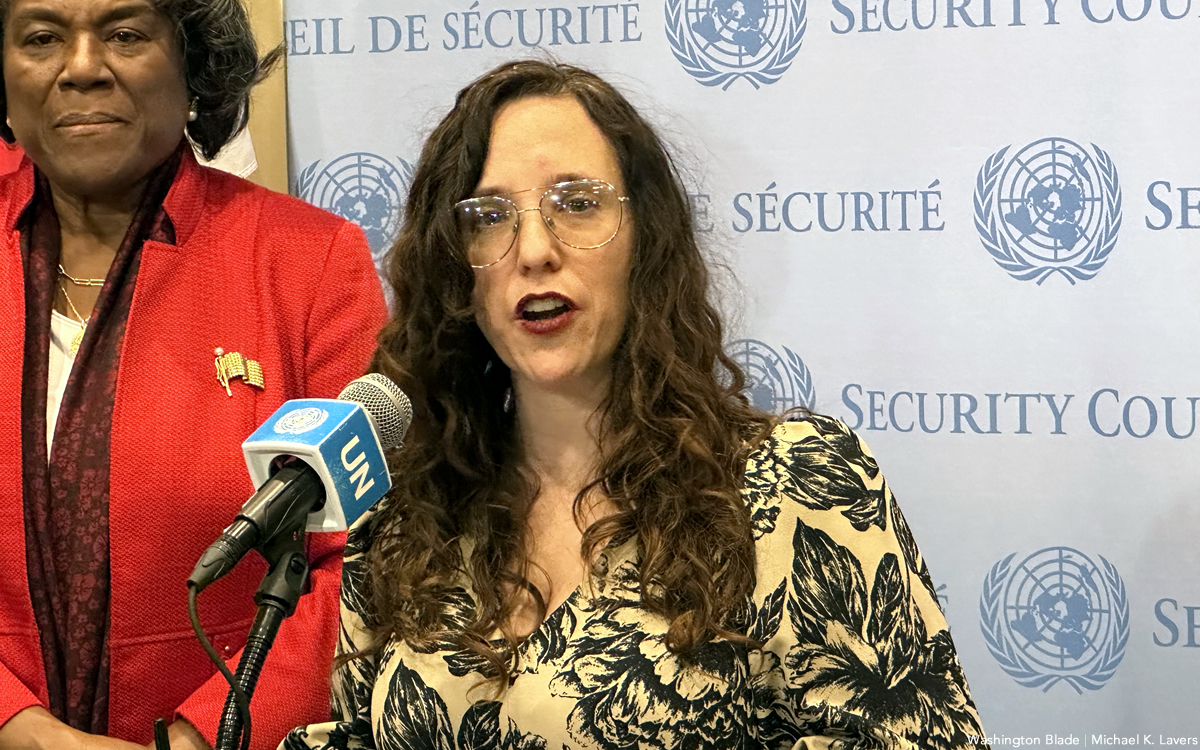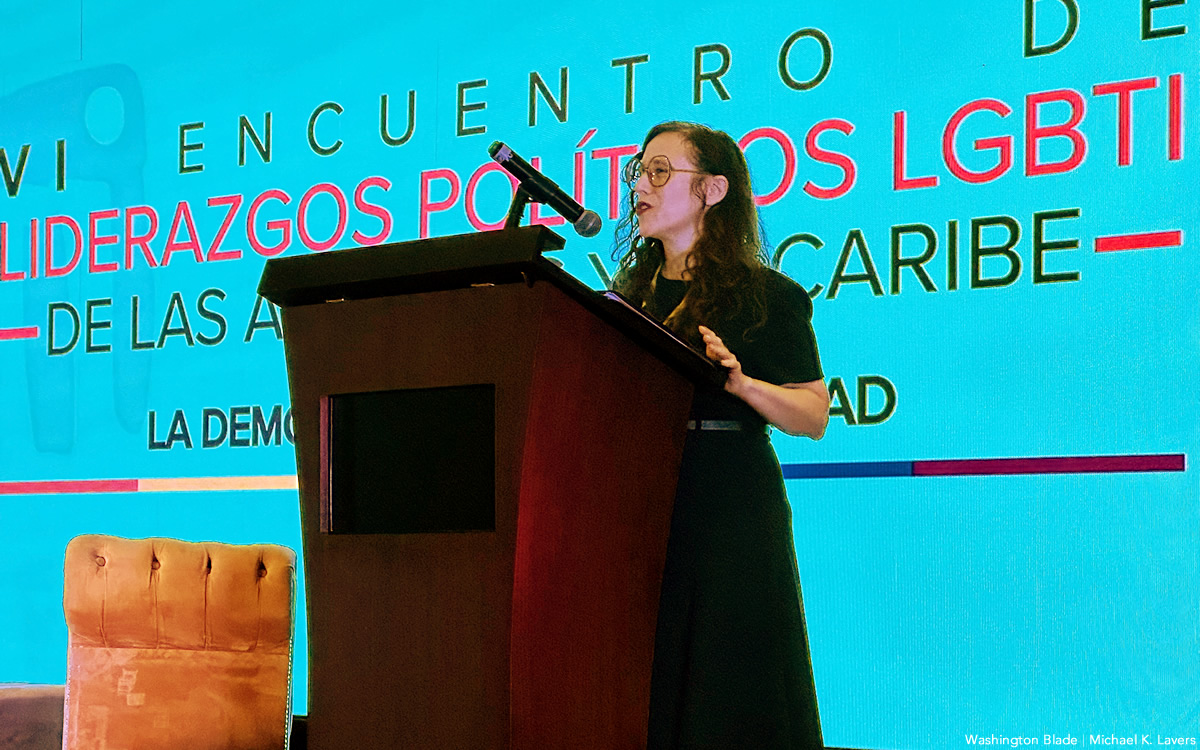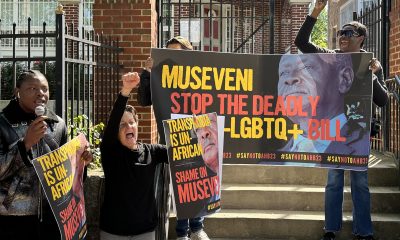State Department
U.S. officials postpone Uganda PEPFAR meeting
April 25 letter cites need to assess Anti-Homosexuality Act impacts

American officials have postponed a meeting on the President’s Emergency Plan for AIDS Relief’s work in Uganda in order to assess the potential impact the country’s Anti-Homosexuality Act will have on it.
Uganda PEPFAR Country Coordinator Mary Borgman on April 25 sent a letter to the PEPFAR Uganda Country Operational Plan 2023 on behalf of Amb. John Nkengasong, the U.S. Global AIDS Coordinator and Special Representative for Health Diplomacy who oversees PEPFAR.
“I want to thank you for your diligent efforts during the past several weeks for developing the Uganda COP23 plans in a highly complex and shifting landscape,” said Nkengasong in the letter.
“In light of the recent developments with the potential signing of the Anti-Homosexuality Act (AHA) and how that could impact our ability to provide services and assistance, I have made the decision to postpone the Final COP Presentation meeting previously scheduled for April 28,” he wrote. “This postponement will allow us more time to collectively and effectively assess the legal and programmatic implications of the evolving legislation and broder environment in Uganda, which impacts PEPFAR-supported HIV/AIDS programs, and make relevant adjustments in order to resolve COP23 plans as appropriate.”
Nkengasong stressed he is “grateful for the resilience and grace that the team has shown during this difficult time.”
“With regards to current programming, we will continue to assess the needs of PEPFAR Uganda and adapt programs as required to ensure the safety of our staff and beneficiaries and help ensure access to health services remains intact,” he added.
To us who have relatives and friends who are living with HIV/AIDS. This is not good news.
We all know the government of Uganda can not take care of all the individuals living with HIV/AIDS.
We can change this now before it’s too late. #SayNoToAHB23 pic.twitter.com/m3oru08vwh— Steven Kabuye (@SteveKabuye5) April 30, 2023
Ugandan MPs in March passed the Anti-Homosexuality Act.
The bill, among other things, would impose the death penalty upon anyone convicted of “aggrevated homosexuality.”
Treatment Action Group Government Relations and Policy Associate Kendall Martinez-Wright last week during a protest outside the Ugandan embassy in D.C. noted the Anti-Homosexuality Act “will hamper the already struggling efforts in terms of eradicating HIV.” Other activists who spoke noted Family Watch International, an Arizona-based group the Southern Poverty Law Center has designated as a hate group, have cultivated strong ties with Ugandan lawmakers who put forth the bill.
White House Press Secretary Karine Jean-Pierre and Victor Madrigal-Borloz, the independent U.N. expert on LGBTQ and intersex issues, are among those who have sharply criticized the Anti-Homosexuality Act. Jessica Stern, the special U.S. envoy for the promotion of LGBTQ and intersex rights abroad, last month during a panel with four Ugandan activists the Center for Strategic and International Studies hosted said the Biden-Harris administration is “investing the potential impact of the Anti-Homosexuality Act on U.S. foreign assistance.”
U.S. Sen. Ron Wyden (D-Ore.), who chairs the Senate Finance Committee, in a letter he sent to U.S. Trade Representative Katherine Tai and Secretary of State Antony Blinken on April 25 asked them to reconsider Uganda’s participation in the African Growth and Opportunity Act if the Anti-Homosexuality Act becomes law.
“As you know, Uganda is a beneficiary of AGOA, which was signed into law in 2000. AGOA provides duty-free treatment to imports originating from beneficiary African countries. However, beneficiaries of AGOA must meet certain eligibility criteria, one of which is to not engage in ‘gross violations of internationally recognized human rights.’” wrote Wyden. “Relevant to this criterion, jurisprudence in international human rights law clearly supports respect for an individual’s sexual orientation and gender identity as integral to fundamental human rights.”
“For this reason, I strongly urge you to communicate immediately to the Ugandan government, and President Yoweri Museveni directly, that Uganda’s beneficiary status under AGOA will be revoked should he sign the legislation and allow it to be enacted,” added the Oregon Democrat. “President Museveni was an early and active proponent of AGOA and knows first-hand the significance of the legislation and the seriousness that Congress employed in shaping it. The significance of Uganda losing its AGOA beneficiary status will not be lost on President Museveni and other leaders in sub-Saharan Africa.”
The Washington Blade has reached out to the State Department for comment on Wyden’s letter.
Museveni, meanwhile, on April 20 sent the Anti-Homosexuality Act back to Parliament for additional consideration before he signs it.
State Department
Former US envoy for global LGBTQ, intersex rights slams Trump
Former President Joe Biden appointed Jessica Stern in 2021

Jessica Stern, the former special U.S. envoy for the promotion of LGBTQ and intersex rights, says the work that she and her colleagues did under the Biden-Harris administration is “being systematically dismantled.”
“As the person who was responsible for leading U.S. foreign policy on LGBTQI+ issues, it’s been very difficult for the past two months to see that work being systematically dismantled,” she told the Washington Blade on March 19 during a telephone interview.
Stern was the executive director of Outright International, a global LGBTQ and intersex advocacy group, when then-President Joe Biden appointed her in June 2021.
The promotion of LGBTQ and intersex rights was a cornerstone of the Biden-Harris administration’s overall foreign policy. These efforts specifically included the decriminalization of consensual same-sex sexual relations and marriage equality efforts in countries where activists said they were possible through the legislative or judicial processes.
The Trump-Vance administration’s decision to freeze most U.S. foreign aid spending for at least 90 days has had a devastating impact on the global LGBTQ and intersex rights movement. President Donald Trump’s executive order that bans the State Department from issuing passports with “X” gender markers has prompted Germany and several other European countries to issue travel advisories for transgender and nonbinary people who are planning to visit the U.S.
Stern said the Trump-Vance administration “has studied the anti-LGBTQI strategies of other countries and basically imported the worst ideas from around the world: The most violent, the most dehumanizing, the most targeting strategies.” Stern added these policies have emboldened Hungarian Prime Minister Viktor Orbán, Russian President Vladimir Putin, Argentine President Javier Milei and other anti-LGBTQ heads of state.
“It’s one thing when a small country that has limited global reach implements anti-LGBTQI laws and policies. It’s another thing when one of the world’s superpowers does so,” Stern told the Blade. “There’s no question that the U.S.’s regression on LGBTQI rights is actually going to accelerate backlash against LGBTQI people around the world.”
“We provide political legitimacy to those ideas, but also we’re forging new alliances and coalitions, and we’re pushing these ideas on other countries,” she added. “So, it’s not a passive action. The U.S. government currently is actively funding and disseminating anti-LGBTQI hatred around the world.”
Former State Department colleagues ‘afraid every day’
The Trump-Vance administration in a Feb. 3 statement that defended its efforts to dismantle the U.S. Agency for International Development noted examples of the organization’s “waste and abuse” included $2 million for “sex changes and ‘LGBT activism'” in Guatemala and $1.5 million to “advance diversity, equity and inclusion in Serbia’s workplaces and business communities.” Secretary of State Marco Rubio last month said 83 percent of USAID contracts have been cancelled, and the remaining will “now be administered more effectively under the State Department.”
Rubio after the Trump-Vance administration froze nearly all U.S. foreign aid spending issued a waiver that allowed the President’s Emergency Plan for AIDS Relief and other “life-saving humanitarian assistance” programs to continue to operate.
The Blade has previously reported PEPFAR-funded programs in Kenya, South Africa, and elsewhere have suspended services and even shut down because of a lack of U.S. funding. UNAIDS Executive Director Winnie Byanyima on March 24 said 6.3 million more people around the world will die of AIDS-related complications over the next four years if the U.S. does not fully restore its foreign assistance.
Stern said her former State Department colleagues are “afraid every day.”
“They never know, ‘Am I going to be fired today?’ “Am I going to be put on administrative leave?’,” she said. “I cannot even imagine what it’s like to go to work every day.”
Stern told the Blade her former colleagues tell her that “there’s not a lot of foreign policy work happening because there’s so much disruption being caused by DOGE (the Department of Government Efficiency).”
“Entire departments have been decimated,” she said, noting one of them has lost 60 people. “It’s almost inconceivable to figure out how to restructure your work when your resources have been decimated.”

Stern described herself as “an eternal optimist” when the Blade asked whether she thinks the U.S. can ever stand for LGBTQ and intersex rights abroad.
“You have to believe in human rights,” she said.
Stern said former Secretary of State Antony Blinken as “an ally on LGBTQI issues.” Stern also said many of her now former State Department colleagues thanked her and her team for their work before they left government.
“There’s so much compassion from straight and cisgendered allies, from career officials, people that are not human rights experts or specialists, people that don’t focus on the well-being of LGBTQI people, but people that care very much about the United States standing for its values, the rule of law, equality for all, and this notion that it is in our national interest to ensure that there is safety, prosperity, and well-being for people around the world,” she said.
“The situation we find ourselves in will not last forever,” added Stern. “What we have to do is figure out how to hold the line right now, and how to organize for the future.”
She stressed ways to “hold the line” include litigation, protests, letters-to-the-editor, demanding accountability from lawmakers.
“There’s so much to do,” said Stern.

Stern is currently teaching at Columbia University’s School of International and Public Affairs, and is writing about her experience as the “first-ever human rights expert to be the special U.S. envoy for LGBTQI rights.” Stern also told the Blade that she is working to launch a new organization.
“I love being an activist again,” she said. “If there was ever a time when activists are needed, it’s now.”
“I am really proud to have rejoined the resistance,” added Stern.
State Department
Report: State Department to remove LGBTQ information from annual human rights report
Spokesperson declines to ‘preview’ information ‘at this time’

The State Department has not commented on a report that indicates it plans to remove LGBTQ-specific information from their annual human rights report.
Politico on March 19 reported the Trump-Vance administration “is slashing the State Department’s annual human rights report — cutting sections about the rights of women, the disabled, the LGBTQ+ community, and more.” The Politico article notes it obtained “documents” and spoke with “a current and a former State Department official who were familiar with the plan.”
“We are not previewing the human rights report at this time,” a State Department spokesperson told the Washington Blade on March 21.
Congress requires the State Department to release a human rights report each year.
The 2023 report specifically noted Uganda’s Anti-Homosexuality Act that contains a death penalty provision for “aggravated homosexuality.” The 2022 report highlighted, among other things, anti-LGBTQ crackdowns in Afghanistan, Russia, and Hungary and so-called conversion therapy.
President Donald Trump since he took office has signed a number of executive orders that have specifically targeted the LGBTQ and intersex community. These include the “Defending Women from Gender Ideology Extremism and Restoring Biological Truth to the Federal Government” directive that, among other things, bans the State Department from issuing passports with “X” gender markers.
The State Department has eliminated references to transgender travelers from its travel advisories. Germany, Denmark, and Finland have issued travel advisories for trans and nonbinary people who are planning to visit the U.S.
A directive that Secretary of State Marco Rubio issued bans embassies and other U.S. diplomatic institutions from flying the Pride flag. (Former President Joe Biden in March 2024 signed a government spending bill with a provision that banned Pride flags from flying over U.S. embassies.)
The U.S. has withdrawn from the U.N. LGBTI Core Group, a group of U.N. member states that have pledged to support LGBTQ and intersex rights, and the Organization of American States’ LGBTI Core Group. The Trump-Vance administration’s decision to suspend most U.S. foreign aid spending has been a “catastrophe” for the global LGBTQ and intersex rights movement.
State Department
US withdraws from OAS LGBTI Core Group
Decision ‘in line with the president’s recent executive orders’

A State Department spokesperson on Tuesday confirmed the U.S. has withdrawn from the Organization of American States’ LGBTI Core Group.
The U.S., along with Argentina, Brazil, Canada, Chile, Colombia, Mexico, and Uruguay, co-founded the Core Group in 2016 during that year’s OAS General Assembly that took place in the Dominican Republic.
“We look forward to deepening our collaboration at the OAS on issues impacting LGBTI persons so as to enhance dialogue, cooperation, and the sharing of best practices at regional and multilateral levels, recognizing also the various efforts and developments undertaken by and in member states,” reads a joint statement the countries issued on June 15, 2016. “Furthermore, we encourage and welcome the participation of other interested OAS member states in the membership and activities of the Core Group.”
“We also look forward to collaborating with civil society organizations and other social actors as we seek to further shared goals,” it adds. “Our commitment in these areas is firm and will remain so.”
President Donald Trump since he took office on Jan. 20 has signed a number of executive orders that have specifically targeted the LGBTQ and intersex community. These include the “Defending Women from Gender Ideology Extremism and Restoring Biological Truth to the Federal Government” directive that, among other things, bans the State Department from issuing passports with “X” gender markers.
A directive that Secretary of State Marco Rubio issued bans embassies and other U.S. diplomatic institutions from flying the Pride flag. (Former President Joe Biden in March 2024 signed a government spending bill with a provision that banned Pride flags from flying over U.S. embassies.)
“In line with the president’s recent executive orders, we have withdrawn from the OAS LGBTI Core Group,” the State Department spokesperson told the Washington Blade.
The U.S. last month withdrew from the U.N. LGBTI Core Group, a group of U.N. member states that have pledged to support LGBTQ and intersex rights.
-

 Opinions5 days ago
Opinions5 days agoIt’s time for new leadership on the Maryland LGBTQIA+ Commission
-

 The White House4 days ago
The White House4 days agoWhite House does not ‘respond’ to reporters’ requests with pronouns included
-

 Arts & Entertainment5 days ago
Arts & Entertainment5 days ago‘Gay is Good’ Pride Pils Can Celebrates Frank Kameny’s 100th Birthday for WorldPride in D.C.
-

 Sponsored5 days ago
Sponsored5 days agoTHC Drinks: What You Should Know About Cannabis Beverages












